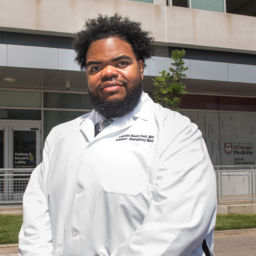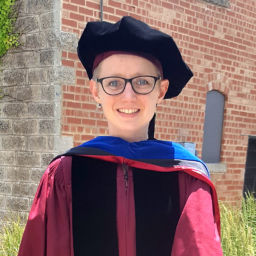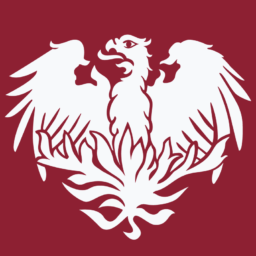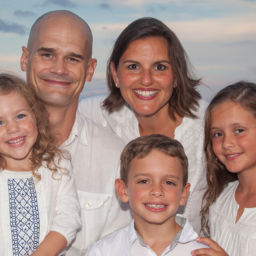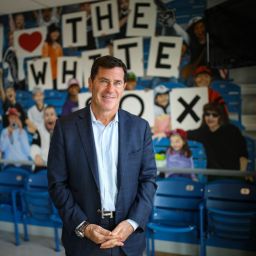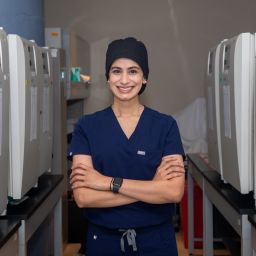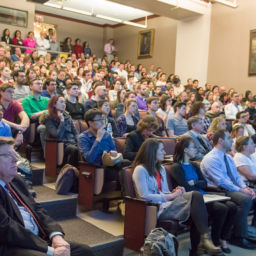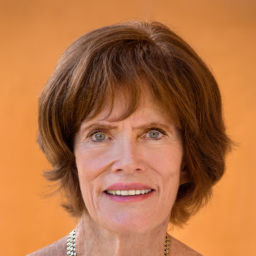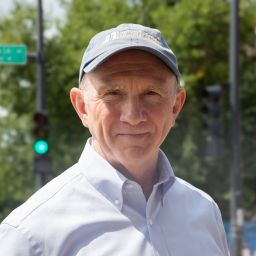When Cary Keller, MD’78, was applying for jobs after his sports medicine fellowship, he saw himself working in an urban academic medical center. It was the mid-1980s, in the early days of sports medicine as a distinct medical discipline. Keller knew that he wanted to be at a place where he could build a multispecialty sports medicine center—a place that could provide clinical care as well as rehabilitation and physical therapy for athletes, and outreach to local school teams.
He ended up finding an opportunity at a clinic in Fairbanks, Alaska—far from the urban academic medical center he thought he’d be working in. When he asked during his interview if they would let him build the center he imagined, “they were willing to put $1 million into building it,” says Keller. “They must have been crazy!”
They weren’t. In 1986, Keller founded Sportsmedicine Fairbanks, where he is now medical director. And, as he had wanted, he takes an active role in his community as the team physician for the University of Alaska, Fairbanks, and for Fairbanks-area high-school teams.
For Keller, medicine is more than a career—it is a responsibility. Growing up, he listened to his father, Carl Keller, MD’57, a psychiatrist, tell stories about his patients and his attempts to help them, as well as “his philosophical approach to that calling.”
These stories nurtured in Keller a desire to be a physician who could reach as many people as he could by being involved in clinical care, research, and teaching. “I believed that was the definition and the mission of a physician,” he says. “I still believe that Pritzker and its faculty, like no other school, share that philosophy and are dedicated to training physicians who are competent in and capable of assuming responsibility and making significant contributions in each of those dimensions.” At Pritzker, he saw what his father described when he was telling his stories—his teachers and mentors truly caring for patients, being thoughtful and respectful, and—his words—being “compulsively dedicated.”
For both Keller and his father, the mission of Pritzker is synonymous with the mission of its former Dean of Students Joseph J. Ceithaml, SB’37, PhD’41. Keller’s father came from a poor family of European immigrants, but Dean Ceithaml noticed his “strength of character and work ethic,” Keller recalls, “and generously offered my father a place in the medical school class.”
The struggles didn’t end there. When his father was a medical student—living with his wife and an infant Cary Keller in a basement apartment on Dorchester Avenue— “the toilet in the apartment would freeze every night in the winter,” says Keller, “and my mother had to break up the ice in the toilet in order to wash my cloth diapers in the toilet every morning.”
Just as Keller’s father felt that he owed his medical career to Dean Ceithaml, so does Keller. “The only medical school that fit my philosophy of the expectations of a physician was Pritzker, and the only medical school that offered me admission was Pritzker,” he says. “On more than one occasion, as I struggled with the challenges of my work or the death of a patient, I would walk by Dean Ceithaml’s office door and then by my father’s class picture for renewed inspiration and confidence. Because Dean Ceithaml believed in me, I am a physician.”
Keller started medical school expecting to become a psychiatrist, like his father, but by the time he graduated and went on to residency at the University of Chicago, he had switched to orthopaedic surgery. “I found that I tremendously enjoyed the intellectual continuum between knowing anatomy well, doing a good physical examination, correctly interpreting the physical findings and history, and performing good clinical and surgical care,” Keller says. “And there is great vicarious pleasure in seeing your patients recover and succeed in attaining their goals.”
As a resident in the Billings and Wyler emergency rooms, Keller encountered injured University of Chicago student athletes. “There wasn’t any program for providing medical care to the athletes,” he says, and sitting for eight hours in the emergency room waiting to see a doctor was not an ideal health care option for them.
Keller started regularly visiting the athletic training room and attending games on campus. Eventually, he started traveling with the football team for away games. “I had to double up my call during the week,” he says, “so I could get time off on the weekends to travel with the team.”
He knew by then that he wanted to take care of teams and athletes for his career. Accepting a fellowship at Cincinnati Sports Medicine and Orthopaedics Center, he was in the right place at the right time: U.S. Olympic athletes were training there for the 1984 Olympics in Los Angeles, and Keller helped care for the U.S. Men’s Olympic soccer team. “It was a pleasure to take care of Olympic athletes and to work with the U.S. Olympic Committee staff,” Keller says. “The athletes are purely dedicated to training and competing. Their work ethic is unmatched.”
He finds a similar work ethic in the populations he treats in Alaska. “There are a lot of industrial athletes, like people who have very physical high performance jobs in the mining, timber, petroleum, and fishing industries,” Keller says. “They benefit from the same principles of athletic care and rehabilitation that benefit traditional athletes.” And in addition to treating the Division 1 hockey players at the University of Alaska, Fairbanks, Keller also takes care of Iditarod mushers—and occasionally their dogs.
Keller may not have a lot of free time, but when he does, he is in the perfect place. With his wife of 20 years, Sarah, a wildlife biologist, he can jump in a kayak or take a walk at night and look at the Northern Lights. “Time with my wife and daughters”—Ally, 19, and Katie, 24—“is precious.”
Keller hopes he has passed on the same lessons that his father and Dean Ceithaml taught him to Katie, who is now applying to medical school. “It is important to me that I return the faith Dean Ceithaml expressed in me by taking great care of my patients,” Keller says, “fulfilling my role as a life-long teacher, contributing to research knowledge, and striving to make a definitive impact on the health of large numbers of people.”


